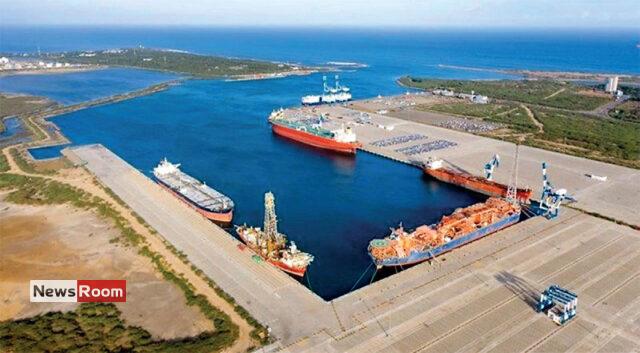As geopolitical tensions in the Middle East threaten to shut down the Strait of Hormuz, maritime and logistics experts are highlighting Sri Lanka’s Hambantota International Port (HIP) as a potential strategic beneficiary in the evolving global shipping landscape.
The Strait of Hormuz—a vital chokepoint for nearly 20% of the world’s oil and a substantial volume of liquefied natural gas (LNG)—now faces a real risk of prolonged disruption. Such a scenario, experts warn, could send shockwaves through global energy markets and shipping networks.
Yet, amid the looming crisis, maritime specialists see an unexpected opportunity for Sri Lanka.
A Strategic Lifeline in the Indian Ocean
“With east-west trade likely to be rerouted around the Cape of Good Hope, vessels will need alternative bunkering and transshipment hubs in the Indian Ocean,” noted one shipping analyst. “Hambantota, located just 10 nautical miles from the main East-West shipping route, is uniquely positioned to fill this gap.”
With its deep-water capacity and expanding logistics facilities, HIP could serve as a critical stopover for container ships, LNG carriers, and oil tankers bypassing the Persian Gulf. Industry insiders also point to nearby Galle Port as a complementary location for crew changes and minor servicing.
“With limited regional alternatives beyond Singapore and Djibouti, Hambantota can emerge as a key logistics and support hub—if Sri Lanka acts quickly and decisively,” said a senior maritime consultant based in Dubai.
Beyond Oil: A Logistics and Energy Hub in Waiting
Experts believe Hambantota’s potential extends well beyond vessel refueling. Its free port status and existing storage infrastructure offer the capacity to serve as a temporary energy storage and redistribution centre.
“Oil and gas exporters in the Gulf may look for secure, neutral hubs to reroute their cargoes,” explained a Colombo-based energy logistics advisor. “Hambantota could be developed as a staging ground for petroleum, petrochemicals, and fertiliser bound for India, Southeast Asia, or even East Africa.”
They further emphasised that Sri Lanka must position the port not merely as a stopover, but as a value-added logistics node—complete with fast-track customs clearance, expanded warehousing, and security assurances for international partners.
A Test of Economic and Diplomatic Agility
This potential shift also requires strategic diplomatic engagement.
“Sri Lanka’s non-aligned status is an advantage—but it must be backed by tangible assurances of neutrality and operational reliability,” said a regional logistics strategist. “This is not just about moving ships. It’s about projecting resilience and relevance in a disrupted global order.”
Experts underscored that while geopolitical disruptions carry economic risks, they also create openings for smaller nations to assert strategic value.
“Hambantota can be more than a Chinese-invested port—it can become South Asia’s service hub for a world in flux,” one maritime trade specialist concluded.








